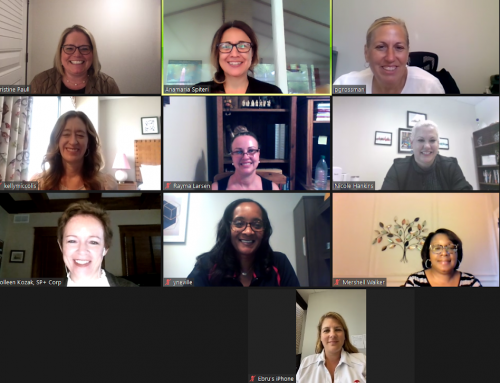Chapter Leaders Damaris Brito, Jayna Perez, and Yekesha Frederick hosted a Lunch and Learn with special guest Nicole Hankins and Chris Sherman.
The topics discussed were the 2020 Monthly Agenda and “Mindful Communication: How to Manage Conflict as a Leader with Your Supervisor.”
There is no perfect boss and there is no such thing as a perfect employee. We are all humans. Mistakes and misunderstandings will happen. We must focus on problem-solving. Problem-solving is positive, and a growth opportunity, for everyone involved.
Mindful Communication
How to manage conflict as a leader with your Supervisor?
1. Focus on your career success.
Give your best, even in a difficult situation. Stay collected and self-manage to focus on the big picture, your career success. Conflict can demoralize individuals to a point in which they disengage. You do not want to disengage; you are strong and capable of trying your best in trying situations. As a leader, conflict is an opportunity to polish your skills, showcase your resilience, and establish yourself as a capable. Conflict is an opportunity for development. Stay aligned with your values and vision.
2. Know what is important to your boss.
Find ways to manage and influence behavior. Get to know your supervisor. Professionally, what do they like and what do they dislike. What challenges are they facing? This is not to gain attention; this is to find an alliance and recalibrate perspective. Intelligence gathering to build commonality will help to ease the tension that is clouding the atmosphere. Communication styles vary and perhaps this is an opportunity to advance communication skills and influence behaviors, as a leader. But do not try to “fix” your superior. Work to understand. Put yourself in their shoes. Empathize with their concerns.
3. Never mirror “bad behavior”. Do not get into a power struggle.
Self-regulation is an incredible skill to build on. Knowing when to share your thoughts and experience is vital. Do not share your thoughts and experience during a time in which you are “charged up”. Complete your best stress management activity to gain clarity and communicate strategically. In every interaction, the person who has the most control over their emotions look the best.
- Have the conversation privately
- Be respectful
- Be specific
- Focus on the problem, not the person
- Frame the issue in a non-threating manner
4. Take another look at how you are approaching things.
Pointing the finger does not dismantle the struggle. And I am not asking you to blame yourself. Instead, ask yourself if there is anything you can do to make the situation better, including how to adjust your style for effective results. Build an understand. Looking inward can be incredibly insightful, impressive, and rewarding.
Triggering words or phrases to avoid:
Impossible- Instead, state what you have done, showcase ideas/solutions that may help and ask your supervisor for guidance on the best course of action. De-emphasize what can’t be done and emphasize your skills and willingness to collaborate.
You’re wrong- Instead, focus on de-escalation. You can be brave and honest without placing blame. You can express concern and empathize to rationally problem-solve, and not sabotage your career growth.
That’s not my job/ I am not paid enough to do that- Instead, reassure the supervisor that you are more than prepared to champion difficult situations and that may require additional training and resources to be successful.
“But”- “But” means “forget everything I just said, what say after “but” is what I want to express”. Replace “but” with “and”.
What’s your problem- Empathize with the supervisor. It is likely they have information that they are not allowed to share. Maintain a natural attitude or bring up a positive aspect of the situation to direct the conversation into problem-solving with mindfulness.
In Conclusion…
By applying these suggestions while dealing with a difficult supervisor, you will either give no response or give mindful measured responses. Keeping in mind your long term needs to work together as a team. If you decide to speak up, please remember:
- Have the conversation privately
- Be respectful
- Be specific
- Focus on the problem, not the person
- Frame the issue in a non-threating manner







